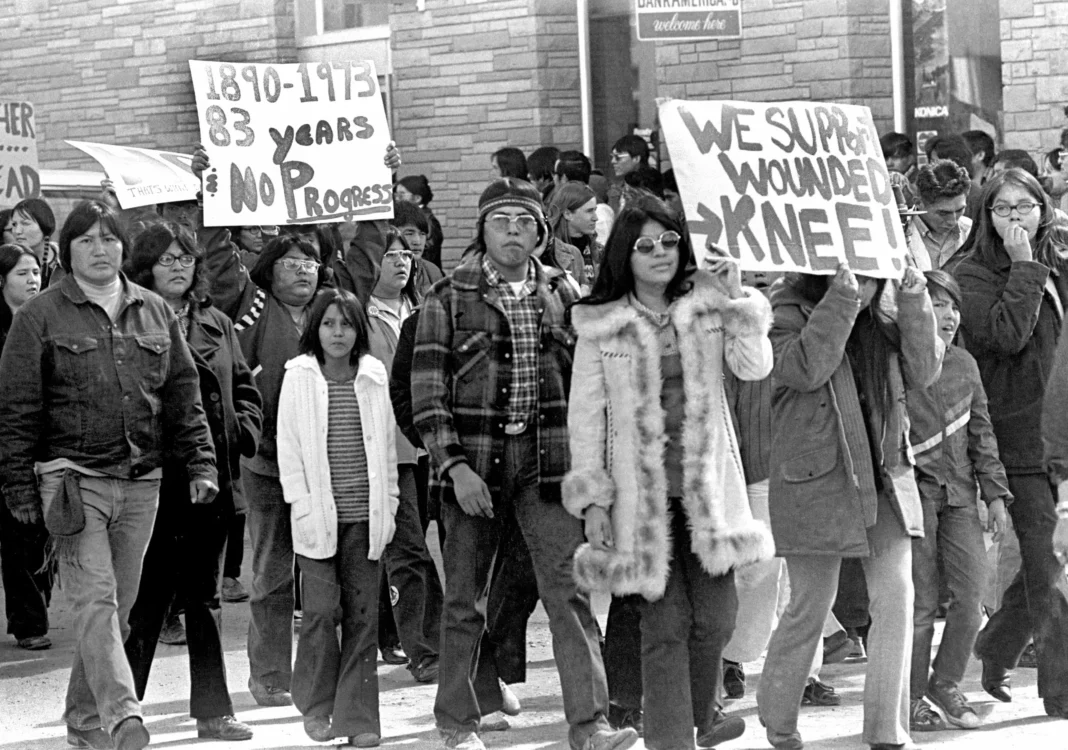Despite being eligible for parole since 1992, Leonard Peltier remains behind bars. This is a clear indication of the federal government’s determination to repress and criminalize the American Indian Movement (AIM). Peltier, a member of the AIM, has been serving a life sentence for the murder of two FBI agents in 1975. However, his conviction has been marred with controversy and many believe that he is a political prisoner.
Peltier’s story is one of injustice and oppression. Born in North Dakota in 1944, he grew up on the Turtle Mountain Indian Reservation. Like many Native Americans, Peltier faced discrimination and poverty from a young age. But he refused to let these challenges define him. Instead, he became a prominent activist, fighting for the rights of his people.
In the early 1970s, Peltier joined the AIM, a grassroots movement that aimed to address the injustices faced by Native Americans. The AIM was a powerful force, advocating for the protection of indigenous rights and sovereignty. However, their activism was met with fierce opposition from the federal government, who saw them as a threat to their control over Native American lands.
In 1975, a violent confrontation between AIM members and the FBI took place on the Pine Ridge Indian Reservation in South Dakota. During the clash, two FBI agents were killed, and Peltier was accused of their murder. Despite a lack of evidence, he was extradited from Canada and put on trial. The trial was riddled with irregularities, including the withholding of crucial evidence and the coercion of witnesses. Despite this, Peltier was found guilty and sentenced to two consecutive life sentences.
Since then, Peltier has maintained his innocence and has become a symbol of the injustices faced by Native Americans. His case has gained international attention, with many human rights organizations and prominent figures calling for his release. Even some of the jurors from his trial have publicly stated that they regret their decision and believe that Peltier did not receive a fair trial.
Despite being eligible for parole since 1992, Peltier has been denied release multiple times. The parole board has cited his refusal to admit guilt as a reason for their decision. However, Peltier has maintained that he will not confess to a crime he did not commit. This unwavering stance has only further highlighted the government’s determination to keep him behind bars.
The continued imprisonment of Peltier is a clear indication of the government’s efforts to silence and criminalize the AIM and their fight for indigenous rights. It is a reminder of the systemic injustices faced by Native Americans and the lengths the government will go to maintain their control.
But despite the government’s attempts to suppress Peltier and the AIM, their legacy lives on. The AIM continues to fight for the rights of Native Americans, and Peltier’s case has become a rallying cry for justice and equality. His story has inspired countless individuals to stand up against oppression and fight for what is right.
As we reflect on Peltier’s case, we must remember that it is not just about one man’s freedom. It is about the larger issue of the government’s treatment of Native Americans and their ongoing struggle for justice. Peltier’s imprisonment is a stain on the justice system and a reminder of the work that still needs to be done.
In conclusion, Leonard Peltier’s continued imprisonment is a sign of the government’s determination to repress and criminalize the American Indian Movement. But his story has also become a symbol of resilience and the fight for justice. We must continue to raise our voices and demand his release, and in doing so, we stand in solidarity with the Native American community and their ongoing struggle for equality. It is time for the government to acknowledge their wrongdoing and grant Peltier the freedom he deserves.


